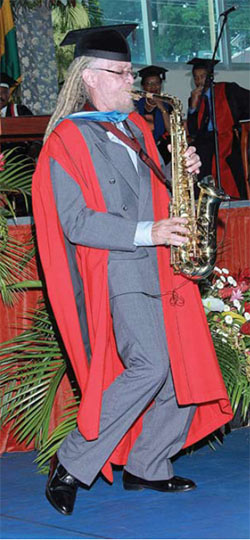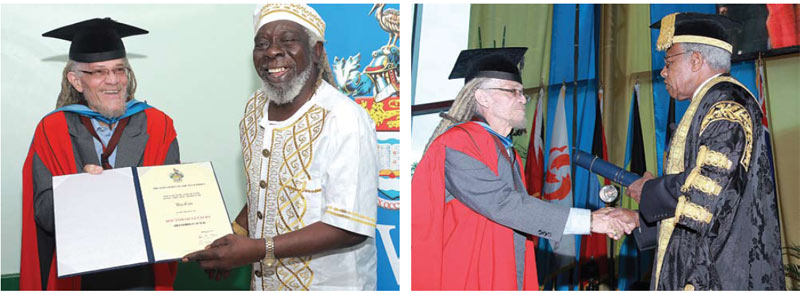 |
 |
 |
|
November 2011
|
HONORARY GRADUATE CITATION Doctah HornRoy Cape
Like the maternal drum, Roy Cape’s horns have been making music and providing sustenance to our minds and hearts and souls for more than 50 years. Born in Success Village, Laventille, failure was never on his agenda. Institutionalized at age 12 at a Dickensian-styled orphanage, in an environment where many others would have been broken, he flourished. There he found hope, his faith and his calling. He was there introduced to the clarinet and the saxophone. His love for music may have been nurtured by the steelpan but his infatuation with horns has blossomed into an enduring and lifelong romance. His contribution to the Caribbean soundscape is monumental. In particular, his exploits in brass music are beyond compare. But his contribution to the steelband movement though far less obvious is noteworthy. He has mentored, connected personalities and built relationships that have godfathered the pan movement. Twenty years ago, he founded the Roy Cape All Stars of which he remains the leader and musical director. This is the band of choice for most singers, composers, kaiso and soca artistes as well as masqueraders and party-goers. Roy and his band have been great ambassadors of the calypso and soca art forms and have been responsible for spreading that gospel far and wide. Roy has toured, travelled and performed widely, taking his music and his musical message to the WOMAD and Portsmouth Festival in England, the Hoogstraten Festival in Belgium, The Helsinki Festival and the 2006 World Cup Soccer Finals in Germany. Of course, he has toured and performed extensively across the Caribbean. Numerous articles in the popular press have highlighted and paid glowing tribute to his work. In 2004, he received the Humming Bird medal in gold in the national honours list. Here is a man of disarming simplicity and subtle sophistication. His preference, however, might be for poetry rather than prose so here goes
Chancellor, when you receive him and confer upon this Caribbean Man, this music maker, mentor and man of music, the degree of Doctor of Letters, honoris causa, we shall, as we already do to his devoted friend Black Stalin, have to refer to him deservedly as “Doctah.”
|

 It is easy to understand why music is the universal language. The ethereal sound of the maternal heartbeat was the first drum. It was that music which with every pulsation conveyed nourishment to our souls.
It is easy to understand why music is the universal language. The ethereal sound of the maternal heartbeat was the first drum. It was that music which with every pulsation conveyed nourishment to our souls.